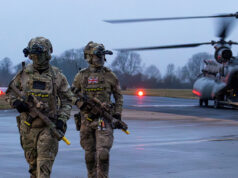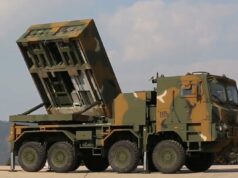The Ministry of Defence’s (MOD) newly released Global Strategic Trends: Out to 2055 outlines several possible future global scenarios, one of which envisions a world where Russia wins the war in Ukraine and China rises to global dominance, leading a new world order.
This potential future, among others explored in the report, highlights how global power dynamics could shift dramatically in the coming decades. These scenarios are part of a broader effort by the MOD to help policymakers prepare for an uncertain and volatile future.
Released on 27 September 2024, the 456-page document presents a range of potential futures. Global Strategic Trends: Out to 2055 describes key drivers of change and illustrates alternative future worlds to test planning assumptions and help decision-makers prepare for an uncertain world.
The Ministry of Defence are keen to note:
“The findings and deductions do not represent the official policy of the UK government or that of the MOD, but the findings will be considered as part of the Strategic Defence Review, which will make sure our Armed Forces are bolstered and that our country has the capabilities needed to ensure the UK’s resilience for the long term.”
The document indicates an abundance of opportunities, alongside new and existing challenges in the global outlook. Notable areas of potential future trends for Defence include:
- A highly uncertain future for Russia, with the outcome of its war in Ukraine and the implications of this being key to its future power and status.
- China will continue to use economic interdependencies, underpinned by military strength, as core means to achieve its objectives.
- In an age of increasing uncertainty, the need to build resilience, agility and new forms of deterrence will be paramount.
- An expansion in the number of nuclear-armed states fielding more powerful weapons, combined with new weapons of mass effect, could create new challenges.
- Military shaping power will remain one of the ultimate levers of power. Space and cyberspace will increasingly be a key factor in battlefield success.
In Pathway 3 – Changing Spheres of Influence, Russia’s victory in Ukraine acts as a key turning point, signalling a decline in Western power. The report suggests that China would seize this opportunity, strengthening its influence and leading a Eurasian bloc that could reshape global power dynamics. Although Russia’s success is not essential for this scenario, the MOD notes that “Russia wins the war in Ukraine” would highlight Western weakness and give China room to grow its global leadership.
The report outlines how “China becomes the biggest economy and the renminbi becomes the leading global currency,” displacing the US dollar and further diminishing Western influence. If China manages its domestic challenges and continues to grow economically, it could extend its reach through trade agreements and technological dominance, while Western nations struggle to maintain their social and economic stability.
Key indicators of this possible future include “emerging middle powers cooperate more closely with China” and “the US retreats from international institutions and its global presence declines.” The report suggests this would lead to a world where influence is divided into different spheres, with China at the centre of a new, more transactional global order.
In this future, China would successfully build a Eurasian bloc, leading a number of emerging powers. As the MOD notes, “China gains influence over a weakened Russia and succeeds in building a Eurasian bloc, involving a number of emerging powers, which then evolves into a new world order operating under strong Chinese influence.” Rather than simply replacing the US, this scenario sees a multipolar world emerge, where global power is distributed more evenly, and Western dominance fades.
The report does point out that, even under this scenario, “other powers will still act in their own interests.” The future described here is not one of ideological alignment but of pragmatism and transactional relationships, where countries seek their own advantages within a shifting global framework.
Global Strategic Trends also highlights that this scenario would not bring global stability. Instead, competition would grow across different spheres of influence, with military and technological power becoming increasingly important. The development of Chinese-led military alliances and advances in space and cyberspace warfare would present new challenges to global security. As the report warns, “Military shaping power will remain one of the ultimate levers of power,” and technological superiority would be critical in future military engagements.
This edition of Global Strategic Trends is the MOD’s seventh in a series that has been running for over two decades. The aim is to help policymakers avoid making decisions based on outdated assumptions. The report stresses that “Without context, there is a risk that planners, policymakers and capability developers will assume a future that conforms to preconceived ideas and assumptions.”
Beyond the scenario where Russia wins and China leads, the report explores several other futures shaped by different global forces.
- In Pathway 1 – Existential threats drive a new multilateral accommodation, global challenges like climate change, pandemics, and organised crime push states to cooperate. The scenario imagines a new multilateral order where global cooperation becomes essential to tackle these existential threats.
- Pathway 2 – The current system endures in a multipolar world sees the US, supported by its democratic allies, maintain its global leadership. In this future, democratic societies remain attractive, and despite rising competition, global conflict is avoided, allowing the current international system to continue.
- Pathway 4 – Competition and decoupling leads to conflict and a deglobalised world foresees rising tensions and competition for resources. Trade wars, protectionism, and the decoupling of global value chains lead to a devastating regional conflict, resulting in the collapse of the current international order.
- Pathway 5 – Incremental instability leads to a new networked order describes a world where state governments struggle to address creeping crises, leading to instability. In this scenario, non-state actors, such as corporations and powerful cities, rise to fill the void left by faltering governments.
These scenarios highlight the unpredictability of the future and the complex forces at play. The MOD’s analysis urges policymakers to prepare for a range of potential outcomes, reminding them that no one can predict exactly what the world will look like in 2055.













Good Evening,
Well based on that report alone (The Ministry of Defence’s (MOD) newly released Global Strategic Trends: Out to 2055) one only hopes the Defence review will take all these factors in to consideration and dramatically increase Defence spending to ensure all our forces are strengthened.
Perhaps it is time to involve all parties to ensure that despite government change our Defence spending is kept high no matter who is in power.
Nick
A very sensible, pragmatic solution… which is exactly why the opposite will happen I am sure
I have long believed that some areas should be taken out of politics and ran in by a cross party solution. Health and defence definitely being two areas that would benefit.
Forget it , the SDR as usual will be mostly defence cuts and especially with traitors in the government as they were the previous onés.
If the Chinese walked into Whitehall tomorrow the Civil Servants would still keep their jobs..just under a new boss..so no need to spend money on Defence
So after the Strategic Defence Cuts Review is published they can spend more months of money and time producing another completely pointless report.😠
What a sack of cobblers.
Russia dies indeed take Ukraine, re-arms and takes out Latvia, throwing NATO into disarray and fragmentation as MS openly debate aiding an ‘Ally’ that has demonstrably alienated its native Russian population?
China builds on this to usurp power in Sri Lanka by promising a bag of rice for everyone and then interdicts global shipping lanes.
Meanwhile, Iran takes the opportunity to make Israel regret its arrogance as bereft of Western support it is set upon by the Islamic world.
Who thought someone would Black Swan the twin towers…
… (Tom Clancey)
Should this crystal star being paid for out of the public purse we need a refund.
quite amazingly, it still completely misses the mark on china and reduces it down to the standard western focus of direct military power and economic power, completely missing key parts of china’s geopolitical and geostrategic goals and purpose….quite amazing really.
Im not sure how many experts on china and it threats can continue to point out that china will and is attacking via a huge number of political warfare routes…it has far more political warfare personal than it has soldiers and the CCP sees everything through the lens of political power and warfare…it does care if the west overmatches it militarily and economically..if it wins politically it knows it wins all.
“To win one hundred victories in one hundred battles is not the acme of skill. To subdue the enemy without fighting is the acme of skill”
To china the PLAN and all its military forces are simply there as an adjuncts to political warfare as it’s its economic might. That’s why the officers of the Chinese military are fully indoctrinated into the fact they are part of the three warfares of political war..legal warfare ( to bog your enemies in international law and opinion so they are unable to act, public opinion warfare and phycological warfare…
Case in point maybe the overlooked fact that Grangemouth refinery is 50% owned by the Chinese state oil company. And it’s closing. Why is our government letting the Chinese reduce the UK refining capacity?
With all due respect Jonathan. I think we have some extremely capable experts on China advising the government. Just because policy doesn’t turn into vast warship building, doesn’t mean that we don’t understand China. Its past, it’s present, and it’s long term future. Just like the UKs influence is far broader than our hard power military capabilities.
Hi Robert I’m afraid you provide my point very well, the west thinks in warships and first day capability..china thinks in how it can undermine a nation over a decade using all aspects of politics warfare, so at the end of it the warships are less relevant and even if it gets it ass handed to it on a plate for most of a campaign thats irrelevant if it’s already sapped the political will of a nation to fight to the end and if it can then either prevent that nation from fighting or tip it into essentially giving up after a time its going to win no matter the balance of kinetic military power at play at the beginning of a war..as long is it’s not completely sept away and can keep fighting it will happy loss a lot.
The PLAN for all the money and it’s power is nothing more than a tool as part of ongoing political warfare…
In the Cold War the west invested a profound amount in understanding the USSR and the USSR were essentially very western in the thought processes.The CCP are as alien to western ideas of geostrategic conflict as you can get…infact they are the exact opposite…
At present I see no indications that western nations are engaging the CCP in the fields of conflict that it is using to attack the west….when anti immigrant riots happen and the far right come out, the CCP is there fanning the flames, when anti Israel protests happen and the Islamists and their happy idiots come out the CCP is there with them fanning the flames…as Africa descends into an anti western anti democratic fug of dictatorships the CCP is there. When western politicians and the public are so far apart there is no trust left the CCP is there..after all a nation cannot go to war and win a war if the public don’t trust its leaders ( the west has essentially lost three wars this century…because of lack of political will..one it did not even turn up to).
The thing was the west did actually get this once and was profoundly good at it…it beat the USSR without the armies of the USSR ever coming out because in the end it killed the USSR using every possible domain of warfare…china is now doing that to us and they are the progenitors of this type of warfare..if we don’t get in the game the extra ships will not matter…although the simple fact china has 260 times the ship building capacity of the US will matter in the long war that china wants….But consider this when we consider a war with china..a nation that gets it’s political warfare correct can only be beaten by the total and utter destruction of that nation and complete strategic exhaustion, a nation that is susceptible to political warfare losses with little fight..the third Reich only ended after the death of a good 20-30 million people, the French third republic fell after only 100,000 people died. The U.S. retreated and gave victory to the Taliban after losing only 88 service personnel killed over the last five years of Afghanistan campaign.
If you read the works of the acknowledged experts in the field of how china fights they are becoming more and more vocal about how western governments are really not listening.
While I understand everything you are saying, Jonathan and I admire your knowledge on this subject. But so far, the only thing China has proven to be good at is monitoring and controlling its own population. An nation of copy cat technology will not rule the world. Which will ultimately be its downfall. I genuinely do not believe that magically, the bulk of the Chinese population are somehow conditioned to fight a decade-long war with the west no matter the suffering, death, and ruination of the global economy. China wants to change the world order, i can see that. But i don’t think its willing to engage in a long term WW3. China needs the global economy to work for its own survival as much as needs to for us. And again. People really underestimate this point. China has zero experience of any type of conflict. Be it on a limited scale intervention. Or a large scale full on long term scenario. I know you are looking at the bigger picture beyond a one-off conflict. But if you can’t win that first one off conflict, then Chinese confidence in its military and its political leaders will evaporate. They are only human after all. They are not robots.
an example is how China changed tack on COVID when there started to be large scale protests on the streets
Yes and the previous pile of sxxt government took chinese money for their parties coffers, how many tories sold this country out for money I wonder 🤔?
Some combination of Pathways 4&5 may be quite plausible. 🤔☹️ BTW, what happened to Pathway 3? Too dire to contemplate? 😉
Pathway 3 – Changing Spheres of Influence is the focus of most of the article 😉
0
Thanks. On MoD website under that title?
Plausible? sounds like exactly what we are living through right now.
😀
Not currently, however in the foreseeable future? Definitely a possibility.
Big question is should the UK be that bothered about any of it? China might be a world hegemony in 2055 but unless it invents a way for ships to fly over mountains or it suddenly annexes France it’s a long way from the UK and the Atlantic.
Whether it’s a Russian victory in Ukraine (highly unlikely) or Chinese hegemony that major answer for the UK is its submarine fleet.
Clearly the MOD realises this which is why it’s poring billions into Barrow.
It might also be possible to argue that given the dire state of Africa and the Middle East under US leaderships it’s perhaps time to let china see if it can do any better.
They should be doubly concentrating on the here and right now to next 5 years too. Do that well and maybe newer options will open up. Does the West and the democratic world really want the likes of autocratic countries to be in charge or to have the balance of power? If you want freedom of the seas and international trade lanes to remain open the Navy and RFA in particular needs to be kept strong. An incremental increase of 1-3 T26/T31 ships and a small fleet of 4 diesel subs to free up the 7 Astutes might help to bring more to more presence in more places. The transitting of the Suez Gulf area could get even more restrictive which might affect the CSG 2025 and could result in some push and shove here if China, Russia, Iran want to link up more with Africa and arming their proxies. Hope the West can stand up for what it represents.
Hi Quentin
Not so sure about the diesel subs. We haven’t built any of those in a long, long time and so regenerating skills for such a small class would be prohibitively expensive.
Instead, I think we should go all in on XLUUVs.
If you go to MSubs website (the people who built Manta) they have a whole range of options for submersibles manned and unmanned.
One of them, Moray, is 25m long and weighs 70t. That gives it room for full AIP and a submerged range of 200km at 5kph, along with, I would imagine, a whole range of useful payloads.
Instead of the fuss of designing and building a whole new manned submarine, why not set up a factory for these? A fraction of the cost for most of the capability, and you can chop and change roles and modules much more easily.
I don’t know what the limits on armament would be, but at least as a sensor platform or minelayer it would be able to do most of the takings expected of a manned submarine (maybe also land attack?).
Otherwise I agree perfectly with you, especially wrt the extra frigates.
We could buy diesel subs from other European nations eg Germany.
But we have a company in the UK that can build submersibles in a sector that is almost certainly going to become very important in future.
If we can turn MSubs into a “factory” producing these in quantity that could go a long way towards rectifying the availability issues with SSNs in a much shorter timeframe than an entirely new manned class.
Or just get Aukus into service in large numbers asap. That would be my preference.
I agree large undersea autonomous vehicles are the way forward, cheaper capital outlay, tiny crewing costs and they will likely have better capabilities..as they don’t need life support or snorkelling.
Good morning SB, happy for sub sea drones as well as a small fleet of SSKs. Just thinking that Poland, Netherlands, Norway and Germany, are all investing in new subs so it could be an opportune time. They’d be faster and have longer range amd have a greater payload and could act as mother ships to drones. Just thinking more of freeing up the Astutes in the short term and the need for extra deep sea capacity for checking of infrastructure and coastal approaches surveillance.
I left out Sweden.
Morning Quentin
I think in many ways a pure XXLUUV (MORAY weighs 70,000kg) fleet would be preferable to a manned component.
So much of what a submarine does and the internal volume is taken up with essentially just keeping the crew alive and functioning. Remember how much of the CETUS concept’s hull was taken up with the payload space? If you could scale that up to twice the size in each dimension, that gives you a lot of room for payload and deployable ROVs etc. You could even include a large towed sonar and contribute to ASW.
Thinking in the short term, the amount of investment and time needed to get these in the fleet would be miniscule in comparison to a manned submarine. They don’t need a full drydock to build in, can be craned in and out of the water (or even carried and deployed from HMS Proteus with the 100t crane) and would take less time in build and design due to the ability to prototype.
Hopefully by 2055 we will have 15 Aukus in service, 4 Dreadnought class and dozens of highly capable long range heavy weight armed USSVs negating China and Russia’s surface fleets.
Our sub sea superiority needs to be maintained and heavily invested in.
More frigates, agree definitely needed. 2-4 more type 26 and a further batch of type 31s would be an excellent choice but that’s for the 2030s and 2040s.
I would honestly say I cannot ever see the RN having more than 8-10 Aukus..they are going to be a good 2 billion a pop so 10 of them is a 20 billion programme.
Thirty years from now might be well defined by what happens in these next few years. How far and fast does the UK go in rebuilding its forces right now to post Ukraine, the relationship with the new US president, Middle East tensions and keeping the international trade routes safe and flowing especially the Suez Gulf. Does the West hold its own? All this is now. Personally, I’m an in the order three more T31s right now camp as they look so useful for the money. Love your passion in your posts BTW!
Thanks. I agree, for the money getting more Type 31s into service should be one of the very top priorities of SDSR 2024
My passion is simply bourne out of being a long term study on geopolitical circumstances and history and what history can teach us.
We seem to be blindly forgetting our history. We are a maritime nation and our security and national wealth is based upon maintaining trade and securing our EEZ (can add our offshore infrastructure to this issue) ergo a strong maritime focussed armed forces equals an affluent UK.
We have to be able to deter and defeat our enemies playing to our strengths and maximising our advantages where they are. Eg navy, sub sea warfare, high performance aircraft and drones deploying advanced munitions that are available in adequate stocks with the ability to replenish from a sovereign whole supply chain weapons used.
To be honest electric boats have little strategic mobility and over the next few years you will probably be able to build a large Autonomous undersea vehicle that can give you the same capabilities ( or better) as an electric boat with a far smaller capital cost and tiny ongoing costs.
Agree. It’s going nuclear and fit long range attack VLS silos for missiles or go home.
USSVs will take up the slack for warfare in shallower waters and patrol as well as possibly inserting and extracting special forces units. An SSK even an air independent one cannot circumnavigate the globe submerged. Have high transit speeds to a conflict zone and then deliver the debilitating ability of sinking an entire surface force whilst remaining undetected. Our Astute class can do that. Aukus will be even better.
I’m sure the indigenous people of Australia and New Zealand may have had exactly the same view point as you – I mean, who could possibly sail around the world and conquer our country?
SSN force? Just 6 or 7 subs, of which 2 or 3 might be available for tasking. Not a huge force.
Yes that’s why we need 12 to 15 SSN-A in 2055.
To ensure availability submarines should be operated on four boats to have one boat deployed.
For me, SSBN to one side, an ideal would be 16 SSN, 12 SSK and a training flotilla of 4 SS. The SSK main tasking would be off northern Norway monitoring Russian submarine movements. There would be a sub-class of SSN with extra VLS for operations in the Mediterranean.
The current situation is far from optimal.
What will your submarines be doing in the Mediterranean?
For what’s basically a NATO lake dominated by Italy and France I don’t see any need for us to spend billions deploying submarines in a safe and secure zone.
You cannot really go half way around the world and subjugate a nation that does not wish to be subjugated and is willing to fight..the only time that has ever happened is when nation or empire’s essentially self destructed and almost invited a foreign power in…the west has some goes in the 21c and it was an absolute failure…the moment India really decided it was seeing the back of the empire we left quickly..when the settlers in the US decided to leave Britain they did. You can only hold and control at distance if there is no organised resistance.
In realty Jim that is a valid question..its always been my premise from what I have read that UK has three paths..
1) fully engaging in outright political warfare with china, as will as ensuring it up arms as part of the west deterrence to prevent a war..this will work if the U.S. and pacific allies do do the same..if the rest don’t fully commit you get to go to pathways two..but having spent a lot of money and being in Chinese’s shit Book for ever.
2) play the game as we are, let china run rampant via political warfare and don’t significantly invests in deterrence ..but keep a policy of combating china and support the US in a war when the likely happens and china invades tiawan in the next decade…WW3 will be a long one, everyone will come out massively damaged and anyone who thinks they know who will win is an idiot..but it is a fair bet to say everyone may loss.
3) the west simply give china what it will never ever negotiate on, Taiwan and then redraws the political map as china becomes an equal partner in the world order.
personally I think one or three are valid pathways.number two is foolish.
So long as we use the word “agility” we’ll all be safe!?????
We need serious re-armament, having wilfully & recklessly buried our head in the sand while Russia & especially China(CCP/PRC) has been attacking us on the not so quiet, vastly expanding China’s forces & seeking to subvert the whole world order.
Any more peace dividend hokum & we’re toast, or at least several nations before we wake up & stop appeasing those bent on our destruction & submission. Think “Year Zero”, think Xingian Uighur “re-education”/genocide, think Hong Kong protesters, think invasion, annexation & occupation of Tibet.
If Ireland or Iceland is going on a genocidal rampage then we definitely need to rearm. If china and Russia are then Poland Germany Japan and Taiwan need to. Currently we outspend all these countries even on a 10 year % of GDP. So why do we need to rearm if the countries near by are not doing it?
Hi Jim, Because Russia wants to restore the post WW2 Soviet empire & the CCP seeks total world domination, in case you haven’t noticed.
We stand for the integrety & self determination of nations, including all the eastern Europe ex-Soviet block, Taiwan etc. We have vital trade that passes throught the SCS & Taiwan straights. We want to preserve our democratic freedoms & avoid tyranny. We’re deterring nobody with forces at below even perfect peace in the world levels. We are allies of all Eastern European states directly threatened by Russia as well as close ties with many in the far east.
It sometimes sounds like you’d like to see a spreading Russo-Chinese tyranny or like an isolationist. The world is too small for us to ignore these threats. An attack on U.S. forces in the far east also obliges us to assist as fellow NATO members. Lastly, Russia & China attacks us virtually 24/7 in grey zone warfare/cyber attacks etc, Russia even used chemical weapons against people here.
Yes but if we stand for self determination of those nations then surely we should allow them to determine their own fate.
Why should we out spend nations to provide security for them if they won’t do it themselves?
Of all those nations Poland has made a lot of noise on defence spending after decades of doing nothing but it’s likely to drastically scale back soon. The other three spend almost nothing and drag their feet.
So why does my granny have to give up her hip replacement to restore the BAOR to defend the self determination of counties that can’t be f**ked.
What’s in it for us?
Even the Soviets never got with in 1000 miles of Britain, the Russians and Chinese have no chance of getting here.
I hear what you’re saying but back in the day we afforded BAOR etc without skimping on hip replacements etc. What’s different is the richest have “opted out” of taxes by moving massive amounts of capital offshore, while the burden has been shifted downwards to everybody else while vital services have been dogmatically slashed dangerously. We are literally dragging our feet, trying to spend little on defence in the face of a very dangerous world on the brink of global war.
As for self determination, The CCP never allowed that for Tibet, Xinjian, Hong Kong, Taiwan etc. All of it does matter to us wether we know it or not. Even Trump only beieves in self determination & democracy when it votes in his favour. Democracy. freedom, rule of law & liberty is under attack & far more precarious than many realise. Even “liberals” here like to shut down views that don’t chime with them, rather than championing freedom of speech. Todays IT/AI etc can be used a perfect tool of repression & surveillance by totalitarian regimes.
What’s different is we have a millions more old people and the expectation of what free government health care can and should do has gone up. The % of tax relative to GDP has stayed pretty flat but less tax is collected from low earners in the UK than the past and the UK gets more taxes from higher earners than any other country in Europe.
Actually, Poland and Japan are rearming. Poland is on glideslope to a 4% of GDP expenditure on defense; Japan has announced plans to double defense budget w/in 5 yrs. Germany may be a special case of extenuating circumstances–although not typically discussed, believe that many w/in Europe have varying levels of discomfort contemplating the prospect of German rearmament, given the historical record. ROC is attempting to rearm, but continues to be restricted in purchases of weapons from other countries, which are fearful of antagonizing the ChiComs. Very few countries are concerned re potential British and French rearmament, given the historical track record of the last century.
We spend 2.3% of GDP, Japan has barely managed 1% in most years and might slowly move to 2% although that’s not for sure as they have no money. They are right next to the threat zone, we are thousands of miles away. So how can they be said to be rearming when we are apparently cutting. Taiwan is also below 2% and maybe slowing moving up, Germany is much the same.
Poland has made alot of announcements and some moves after decades of not meeting the NATO target. Again they have no money and no plan to get past EU spending rules to let them continue in their recent spending spree.
The UK’s defence spending is absolutely fine for the threat environment it faces and it has little need of a big splurge like Poland because it’s had relatively consistent spending over the years.
We certainly don’t spend enough to send a big army to Europe or a big fleet to Asia but we don’t have need of either. If such things were required then countrie like Japan Taiwan and Germany woukd all be spending way more.
Asking British and American tax payers to pay more money to guard countries that don’t care enough to spend their own money is not helping anyone.
Sorry, believe we must agree to disagree re the desirability, nay, necessity, for the West in general to rearm in the context of a globally rising threat environment. We do agree that the voting publics of the states actually making a legitimate effort will resent those in countries which don’t. Others on the site do not agree w/ this assessment.
The Problem is by more burden being placed on US taxpayers and to a lesser extent UK ones it increases resentment and calls for a isolanist foreign policy.
China is already f**ked, Russia is all but gone. Both China and the Russian oligarchs are massive supporters of western culture and the western democratic order despite their public pronouncements.
The West is so massive and powerful that the only thing that really threatens it is US isolationism.
US defence spending is fine, the US needs to get ahold of its cost base rather than just pour more money in. The UK needs to spend a bit more maybe 2.5% of GDP and the rest of NATO+ needs to move atleast up to 2% of GDP. But we need to be careful with talk of rearmament. This is not the 1930’s, we never disarmed. We need some rebalance of force just like in the 70’s in the post Vietnam era.
Your figures are not too accurate Jim.
We don’t spend anything like 2.3% of GDP on defence. The real figure in 2022/3 was 2.07. The year before was 1.9%.
HMG only gets to its vaunted and fictitious 2.3% by lumping in the financial contribution to Ukraine. This cones from the Treasury Contingency fund, not the core defence budget. So it is basically a con to pretend we are spending 2.3%.
Japan, following its post war restriction on defence spending, is going from 1% to 1.4% in the short term, en route to 2% in the longer term. Given the size of the Japanese economy and the fact that they have twice our population/taxpayers, 1.4% is already a sizeable budget.
In fact, virtually every NATO nation and our main allies are increasing their defence spending significantly.
We are one of a very few not to do so. Successive UK governments are content to say, we have nuclear weapons on our SSBNs and two aircraft carriers, that makes us a world player! Reality is we have had to run down our forces and equipment severely to pay for these two largely political baubles.
The bottom line is that we are not really pulling our weight in NATO and nor do we have anything much to tilt anywhere with. We are down to token defence, talking loudly and carrying a short twig.
The thinness of our defence numbers and capabilities will be exposed in any serious war. The civil service and government rely on that hopefully not happening on their watch. If it does, our military weakness will be cruelly exposed and our pretensions of being some influential power will turn to dust.
Our main problem is Russian submarines. Some situation coming about elsewhere and then that having implications here in the North Atlantic. Constantly amazed by how many here purely think in terms of tanks rolling over German plains. Even during the Cold War that was a distraction really.
We don’t have enough ASW to the north. SSN situation is a joke. And more MPA are needed.
I agree Russian submarines are the only threat we really face but Russia has very few nowadays and the numbers are rapidly dropping.
Some of our ASW forces are stretched and there are many temporary issues with frigates and SSN’s but our equipment is world class and light years ahead of Russia and when you look at all the combined NATO ASW assets in the North Atlantic it is an embarrassment of riches compared to what’s left of the Soviet/Russian navy.
World class equipment doesn’t sit alongside wall for month after month.
Do we have an SSN at sea at the moment?
We do, because at present our network of allies means that if there is a china US war we are going to war with china and there is a very very good chance that war will become a long drawn out world war…so investing in deterrence and showing china we mean to fight and will fight hard and to the finish is the only way to deter that war from occurring….unless the US, UK, Japan etc have a sudden change of policy and take our noses out of Taiwan.
Well the MoD and successive treasonous governments have done everything possible to make it happen! Hollowing out infrastructure and fighting ethos from within whilst cutting capabilities and assets.
But still they have no enough, they want to scrap most of the armed furces, wait to the strategic defence review (cuts) and you,ll see.
At the same time they welcome to thousands of illegals mostly muslims, the plan go ahead.
If this vision of hell on earth came about key democratic countries will likely find themselves no longer existing.
The Baltic states would have been invaded by Russia, Hungary would be part of the Russian block further isolating Poland.
Taiwan would be gone
Large parts of the Phillipines would have been occupied under the greater China initiative
Japan would be beset and likely suffering increasing territorial encroachment and provocation from China
India would have become the world’s 2nd largest economy with a vast population by this time. So how would India react?
The EU likely would have bowed to Putin and his Russian empire willingly agreeing to everything requested of them
And the UK? Likely our armed forces by the 2050s will be around 35,000 strong and only operate 2 rowing boats and a few drones.
FFBNEW oars.
Bit too Mystic Meg. “If, but, if, maybe”.
Unless the RN is about to get a significant uplift in its warship numbers, weaponry and capabilities in the strategic defence review any criticism of China and its hostile actions against its neighbours can and will simply be ignored.
I hope to good the strategic defence review is about to get very serious about the evident threats that are growing and start to rearm and prepare the UK for the existential fight that we all know is coming.
The fact NATO is planning for mass casualty evacuation across the length of Europe and NATO itself predicts a conflict vs Russia and its allies within the next 5 years (probably sooner) means time is likely running out and we need to rearm already.
we have the means to do so with the type 26 and type 31 sub programmes, dreadnought subs and astute/ aukus subs and need to crack on and get these built in large numbers and further batches.
…Well if the collective West fail to take the shackles off (weapons for) Ukraine in russia (small r on purpose, absolutely no respect intended) then the scenario where the knobs win is a possibility.
It is so illogical to provide/sell weapons to a state then place constraints on the use of them – shows a distinct lack of resolve on the Wests’ part – while saying ‘we’ are doing all we can to assist.
China is reported to have gone through 300 years of credit in 40 years. Many Chinese banks have no money. Real estate developers have collapsed owing hundreds of billions. Reports of multiple renminbi banknotes with the same serial number. Xi’s lockdowns have caused economic disaster.
I think the long term threat is resource wars in Polar regions.